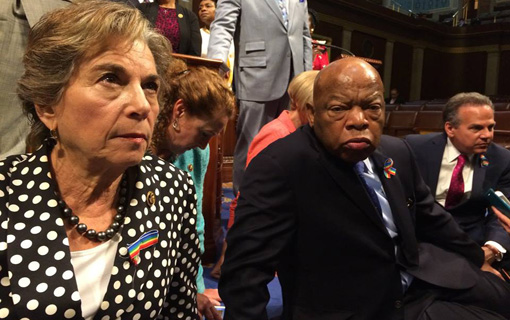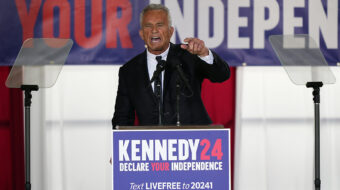
Led by Rep. John Lewis (D-Ga.), members of the House of Representatives Progressive Caucus Wednesday staged an unprecedented act of civil disobedience by sitting down on the House floor and refusing to participate in the scheduled legislative agenda of the day. The image of lawmakers taking such direct action evoked the sit-ins of the Civil Rights Movement and Lewis’s own history as one of its leaders.
As the day went on, sympathetic members of the Senate Democratic caucus came over with food and expressions of solidarity. They ended their action in the wee hours of the morning Thursday. While the sit-in was not illegal, members don’t have the right to do it according to the House procedural rules.
The proximal reason for their action, in response to public outcry at the June 12 gunning down of 49 people at an Orlando LGBTQ nightclub, was to force a vote on what Gawker editor in chief Alex Pareene has already correctly called a “bad, stupid” bill. The measure would restrict those on the government’s secret “no-fly list,” who have been flagged for investigation and are not allowed to board airplanes, from legally purchasing guns. Journalist Marcy Wheeler tweeted that the “no-fly-no-buy” list would require further investment in the secret court system that created the ever-expanding no-fly list in the first place, which is a court that lacks the legitimacy of public transparency or official checks and balances. What is more, it would double down on the implicit bias of the no-fly list, which manages to dragnet just about everybody but in practical terms results in further singling out Muslims, dark-skinned immigrants, and poor people for suspicion and legal trouble.
Worst of all, writes Wheeler, it would not prevent many of the worst mass shootings: “This amendment would deprive Muslims simply investigated (possibly even just off a hostile allegation) for possibly engaging in too much anti-American speech of guns, but would not keep guns away from anti-government or anti-choice activists advocating violence.”
Some Muslims and activists of color have remarked that it is telling that the Democrats chose to sit-in for a bill that would throw the civil liberties of already-marginalized communities under the proverbial bus.
But, others argue, we must look beyond the proximal reason for the sit-in and evaluate it in terms of its potential for breaking the blockade that the NRA and other industry lobby groups have placed on Congress. The NRA is a powerful enemy of gun control in all its forms, including the no-fly-no-buy list. Its lobbying operation includes not only an effective chief lobbyist and monetary donations to campaigns, but also a highly organized rank and file membership who are willing to mobilize to demand that their Congressmembers kill all regulation and background check measures. Such is the blockading power of the NRA that the Centers for Disease Control has refrained from even conducting public health studies on gun violence because of the actual threat from Congress to cut its funding.
The NRA is not the only industry-based lobby that makes a lot of money by killing regulatory legislation. It just happens to be one of the best-organized and oldest. To the extent that this week’s sit-in disrupts the usual daily Beltway business of stopping laws from being made, it will cause shocks to ripple through the banking, weapons manufacturing, fossil fuels, big agricultural, and tobacco industries (to name a few). But, one sit-in will not be effective enough to do this.
There’s big money in gridlock
How did the business of blocking regulations on industry come to be so large and so influential? Despite its periodic infighting and factionalism, the Right has come back together each time around the campfire of its deregulatory agenda. Deregulation is the prime directive given to conservative lawmakers by the captains of industry who sponsor their political careers and who give them lucrative positions after they leave electoral politics.
House Speaker Paul Ryan, who throughout yesterday’s sit-in refused the progressives’ demand for a vote on the no-fly-no-buy list, is one of the darlings of this part of the conservative movement along with Eric Cantor and Kevin McCarthy in the House, and Mitch McConnell and Ted Cruz (among others) in the Senate. They have learned how to break the gears of the legislative branch of government. Refusal to compromise on any portion of their corporate donors’ deregulatory agenda is now the hallmark of their approach to politics, not an anomaly special to the gun issue. The current blockade in the Senate against the nomination of Merrick Garland to the Supreme Court is a good example of how this continuing strategy works for the Right. Until yesterday, it must be noted, the Democrats have followed every procedural rule and allowed the Right to continue to block bill after bill.
So the progressives’ sit-in, while it may contain the kernel of a strategy, is only the first in what would have to be a series of tactical maneuvers designed to force the Right to break its blockade against any corporate regulation. Rep. Ted Poe (R-TX), who was presiding over the chamber, and Ryan ordering aides to dive for the House television cameras as soon as the sit-in started is one indication that this opening gambit could eventually lead to an effective strategy.
Don’t look to the Dems for change
But do the Democrats have the stomach for such a protracted campaign? They, too, have a vested interest in the continued profits of the industries in their home districts. Oil, natural gas, banking, weapons manufacturing, and other industries also look to Democrats to stand aside and let the lobbyists dictate the terms. No matter how exciting it may be to see one’s Congressmember sitting in on the House floor, they are not the ones who will be in a position to make Congress start to pass laws again.
That leaves it up to the rest of us.
John Lewis was brilliant to lead his fellow representatives in this bit of political theater, not because it will immediately break the NRA’s chokehold on gun regulation, but because it reminds us of what we as regular citizens need to do. Business as usual does need to stop; but the political objectives also have to be clear.
Puente, the Phoenix, Ariz.-based grassroots immigrants’ rights organization, took to Facebook yesterday to urge its community to prioritize “militancy of politics” over “militancy of tactics”; in other words, those in working class, poor communities, and communities of color must first identify the political ends they want to achieve-and then organize for them. The sit-in is a sobering reminder that even the most progressive members of Congress cannot serve as a proxy for organized mass movements. Elected officials are already doing what they can do, but they are part of a system that has been manipulated to serve the goals of industry. Their efforts can only ever be a beginning.
Photo: “I am sitting in the well of the House of Representatives with Civil Rights hero, Congressman John Lewis, and dozens of other House Democrats who call on Speaker Ryan to call a vote on common sense gun safety legislation before we leave on break. Our chant is ‘No Bill, No Break!'” Rep. Jan Schakowsky, D-Ill., Facebook

MOST POPULAR TODAY


Zionist organizations leading campaign to stop ceasefire resolutions in D.C. area

Communist Karol Cariola elected president of Chile’s legislature

Afghanistan’s socialist years: The promising future killed off by U.S. imperialism

High Court essentially bans demonstrations, freedom of assembly in Deep South






Comments